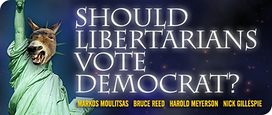Lead Essay
Kicking off this month’s discussion, “Should Libertarians Vote Democrat?”, Markos “Kos” Moulitsas, proprietor of DailyKos.com, argues that the libertarian Democrat’s time has come. Moulitsas says that GOP dominance has been a disaster for limited government and civil liberties, and that growing corporate power poses a grave threat to individual liberty and necessitates government action. “[W]e’ve seen that [the Republican Party] is now committed to subverting individual freedoms,” writes Moulitsas, “while the [Democratic Party] is growing increasingly comfortable with moving in a new direction, one in which restrained government, fiscal responsibility and–most important of all–individual freedoms are paramount.”
Response Essays
In his reply to Moulitsas, Bruce Reed, president of the Democratic Leadership Council, does not try to claim the libertarian mantle: “[I]f you’re looking for government to close up shop, don’t vote Democratic,” Reed recommends. But, Reed argues, there are reasons for more moderate libertarians to support Democrats. “Which party can provide smaller, more efficient government?” Reed asks. “Which party takes the responsibilities of government and limited government seriously enough to actually deliver it? Which party believes in competition enough to wean the country from its dangerous addiction to corporate welfare and make free enterprise work?” Reed’s answer: The Democratic Party.
Washington Post columnist and The American Prospect editor-at-large Harold Meyerson argues that Democratic overlap with libertarianism in matters of civil liberties cannot extend to the economic domain. “The central insight of 20th century liberalism,” Meyerson writes, “was that freedoms conflict, that a company’s freedom to dominate the marketplace was often in conflict with a consumer’s freedom to find a product at a fair price, or a workers’ freedom to find a decent job or form a union, or a citizen’s freedom to have an equal voice in the legislative process.” Today, Meyerson argues an increase in economic insecurity demands an increased role for the state. “Ultimately, the Democrats aren’t going to proceed very far down the libertarian road, for one simple reason that’s far more pragmatic than philosophic: It doesn’t lead anywhere.”
Nick Gillespie, editor-in-chief of Reason, likes the idea of libertarian Democrats, and notes that there are a few, but “when it comes to their own party, they feel sort of like Trotsky during his Mexico City days.” Commenting on the previous essays, Gillespie writes that “even as Moulitsas is ostensibly trying to woo libertarians to vote for Democrats, he spends a good chunk of his essay lecturing his audience like a Hyde Park autodidact about the need for publicly financed roads and education, and railing against that great abstraction of ‘unaccountable corporations’ that lead us into war, make us breathe dirty air, and steal our retirement savings.” Gillespie finds Reed “even less engaging,” while Meyerson’s “uncomplicated nostalgia for the New Deal suggests he thinks he’s living in 1936 rather than 2006.”
The Conversation
Related at Cato
» The Libertarian Vote by David Boaz and David Kirby
» Give Divided Government a Chance by William A. Niskanen
» The Grand Old Spending Party by Steve Slivinski
» Power Surge: The Constitutional Record of George W. Bush by Gene Healy and Timothy Lynch

